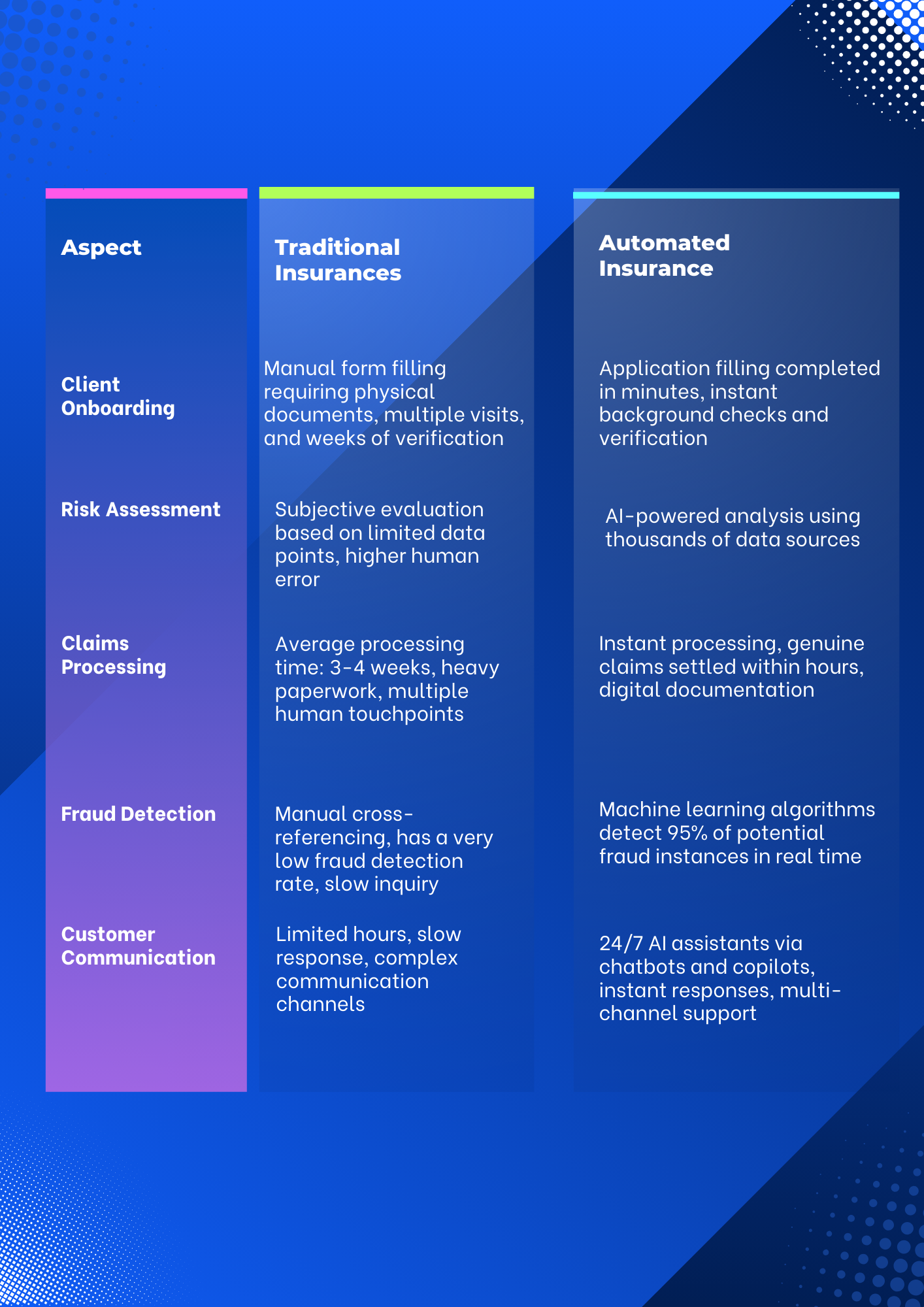Automation in insurance: AI in insurance use cases, benefits and more

Mechanoid Agents & Digital Defenders: Let’s Dive in Insurance's AI Revolution
McKinsey reports that insurance companies using AI and automation reduce their claims processing time by 95%, with some claims that traditionally took weeks now being settled in just a few hours. This dramatic shift highlights why 87% of insurance executives are investing heavily in AI technologies to stay competitive in a rapidly evolving market.
A 2023 Accenture study reveals that insurance companies implementing AI-driven claims automation save an average of $1.2 billion annually in operational costs while reducing fraudulent claims by 75%. This dramatic impact explains why insurance providers that have adopted AI technology report a 40% increase in customer satisfaction scores compared to traditional insurers.
Beyond Paperwork
Insurance automation transcends basic data entry. It's an intelligent system that handles complex processes from risk assessment to claims settlement with minimal human time investment. Think of it as having a digital workforce that processes applications, analyzes risks, detects fraud, and settles claims around the clock.
The ability of automated insurance solutions to process thousands of documents simultaneously, understand the complex policy language, and make decisions based on existing data patterns. AXA Insurance reported that their automated underwriting system processes applications 5 times faster than human underwriters while maintaining 99.9% accuracy.
The AI Uproar in the Insurance Industry:
Artificial Intelligence is reshaping insurance fundamentals:
- Machine learning algorithms predict risk with 90% accuracy, compared to 70% through traditional methods
- Natural Language Processing (NLP) extracts critical information from millions of documents in minutes
- Computer vision technology assesses property damage from photos, reducing assessment time by 80%
- Predictive analytics forecast claim probabilities, helping insurers optimize premiums
Top 5 Applications of Insurance Automation
1. Smart Underwriting
Advanced algorithms analyze thousands of data points in seconds, creating precise risk profiles and appropriate premium calculations. According to a 2023 IBM report 50% reduction in underwriting time while improving accuracy by 30%.
2. Automated Claims Processing
AI-powered claims processing systems validate claims instantly by cross-referencing existing data, policy terms, and fraud indicators. A report from the International Journal for Multidisciplinary Research (IJFMR) reveals that the integration of automation in Insurance has resulted in a 90% reduction in claims processing time through automation.
3. Policy Administration
Automated systems handle policy changes, renewals, and cancellations without manual intervention. Allianz reported handling 3x more policy modifications daily after implementing automation.
4. Fraud Detection
Machine learning models identify suspicious patterns across millions of claims instantly. AIG's AI system caught $126 million in fraudulent claims in its first year of operation.
5. Risk Assessment
AI algorithms analyze satellite imagery, IoT data, and historical records to assess property risks accurately. Munich Re's automated risk assessment system improved prediction accuracy by 45%.
Tomorrow's Insurance: Copilot/Chatbots in Insurance sectors
AI-powered copilots are becoming an effective tool for insurance companies. With advanced virtual assistance, it goes beyond basic chatbot capabilities, serving as intelligent partners who understand complex insurance queries and provide instant, accurate guidance.
The Human Touch in Digital Form
Insurance chatbots can understand context and emotion. When a customer files a claim after an accident, the copilot doesn't just process the claim offers guidance on immediate steps, and ensures the customer feels supported throughout the process. Allianz's AI copilot ‘AIDA’ achieved a 92% positive emotion rating in customer interactions.
Data-Driven Insights for Better Service
Interactions with an insurance virtual assistant generate valuable insights. These systems learn from each conversation, continuously improving their ability to serve customers effectively. They identify common pain points, predict customer needs, and help insurance companies refine their products and services based on real customer feedback.
Proactive Customer Engagement
AI insurance copilots identify opportunities to help based on customer behavior patterns. For example, if a customer has been reviewing retirement planning materials on the website, the copilot might proactively share relevant annuity options or schedule a consultation with a financial advisor.
Predictive Assistance
Insurance AI copilots can predict customer needs before they arise. By analyzing patterns in customer data, these systems will proactively reach out to customers about policy updates, coverage gaps, or upcoming life events that might affect their insurance needs.

Get Insurance Automated and make the time-consuming process effective and efficient.
